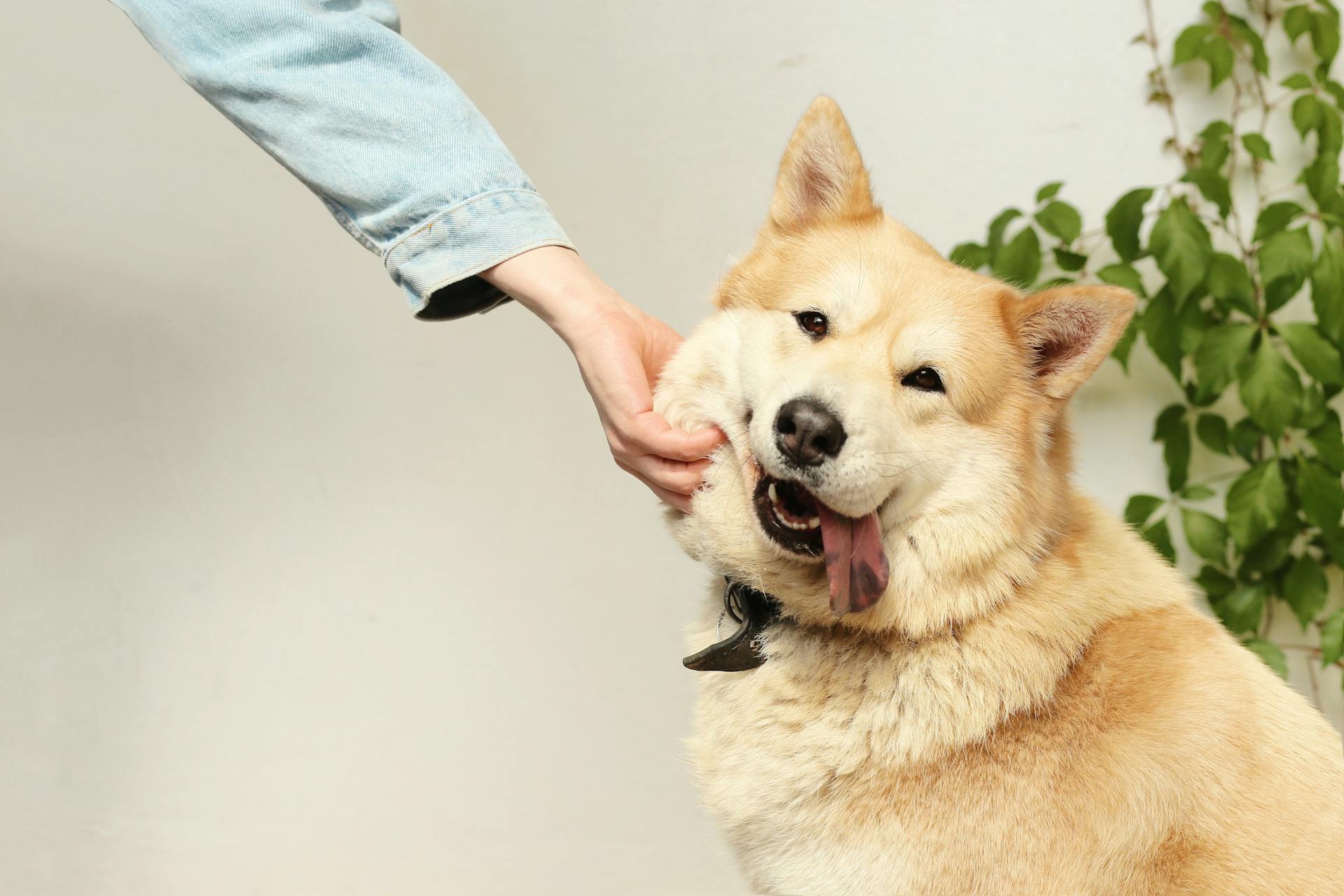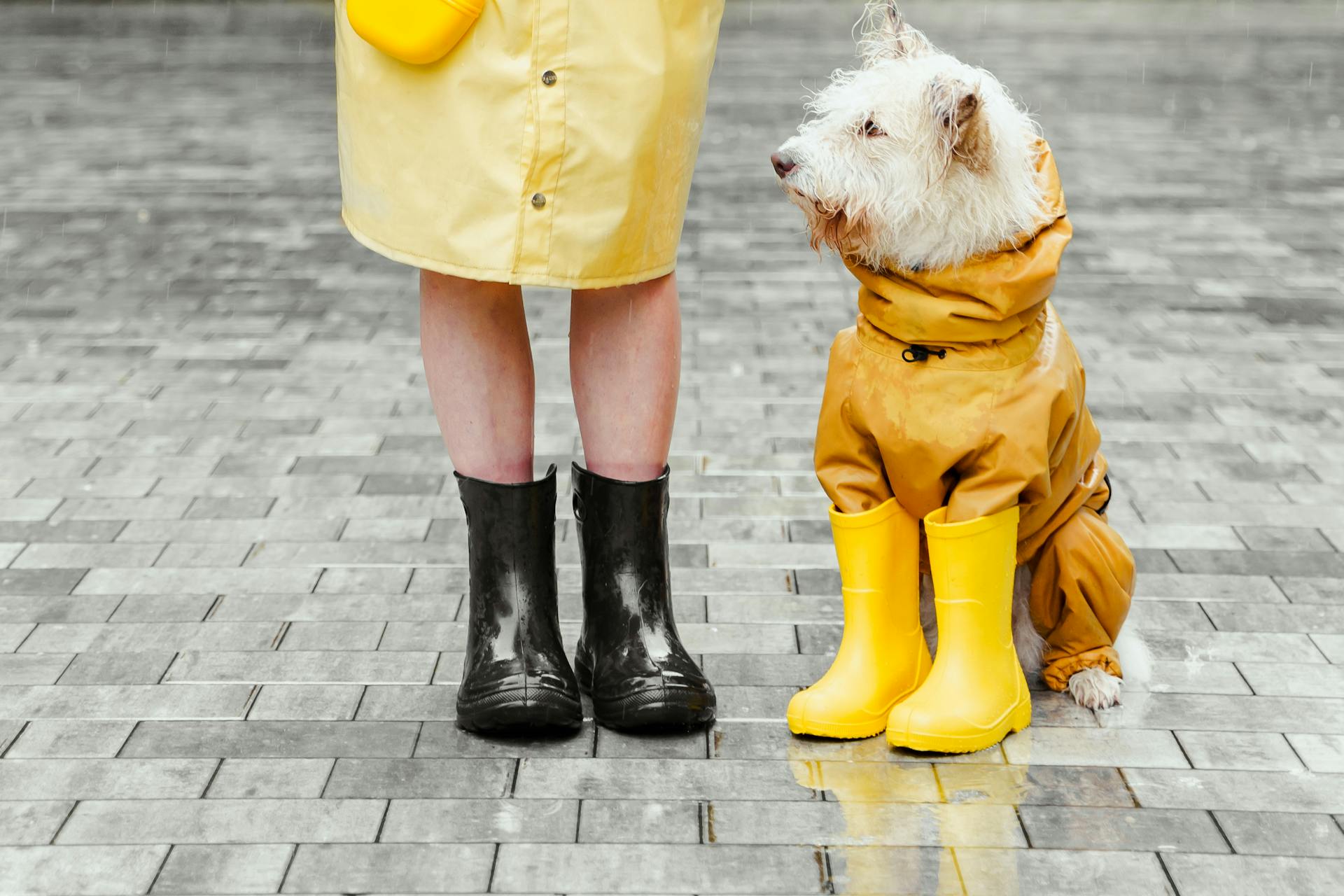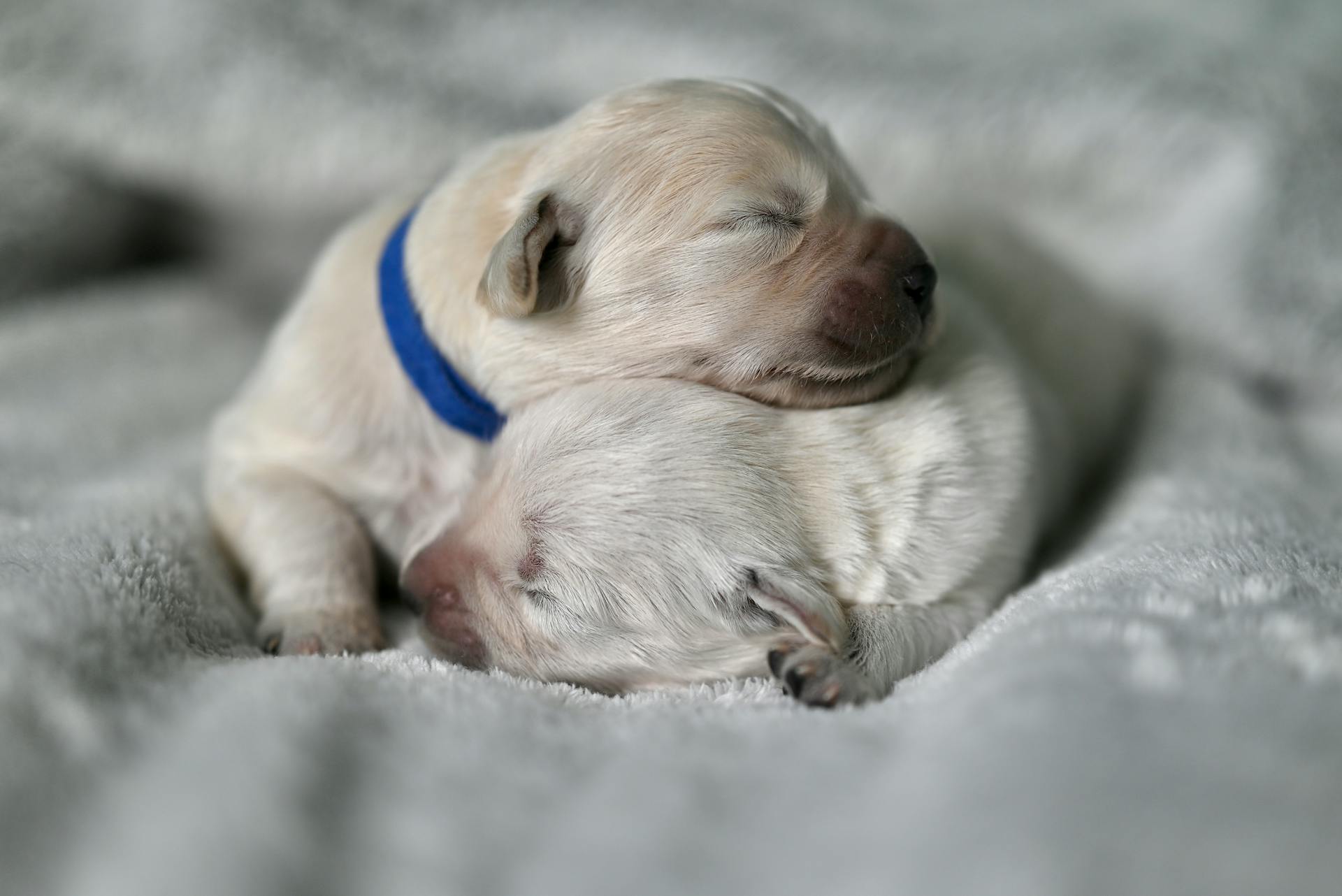
The F1b Mini Bernedoodle is a cross between a Miniature Poodle and a Bernese Mountain Dog, inheriting the best traits from both parents. They are a popular hybrid breed known for their intelligence, loyalty, and affectionate nature.
Their size is a significant consideration, as F1b Mini Bernedoodles typically weigh between 20-40 pounds and stand between 14-18 inches tall at the shoulder. This compact size makes them an ideal choice for families living in apartments or with limited space.
F1b Mini Bernedoodles have a lifespan of 12-15 years, which is relatively long for a hybrid breed. Regular exercise and a balanced diet are essential to ensure they live a happy and healthy life.
Their coat is another notable feature, as F1b Mini Bernedoodles often inherit the Bernese Mountain Dog's thick, double coat, which sheds heavily and requires regular grooming.
Additional reading: Bernedoodle Coat Types
What is an F1b Mini Bernedoodle?
An F1B Mini Bernedoodle is a result of crossing an F1 Mini Bernedoodle with a purebred Poodle.
This generation of Mini Bernedoodle has a higher percentage of Poodle genetics, resulting in dogs with more consistent hypoallergenic and non-shedding coats.
With more Poodle genetics, these dogs often have curlier coats and are more suitable for individuals with allergies or sensitivities to pet dander.
Their parentage introduces a greater degree of predictability in terms of coat type and characteristics.
F1B Mini Bernedoodles generally maintain the loving and friendly disposition inherited from their Bernese Mountain Dog lineage.
They are smart, trainable, and well-suited for various living environments.
Their size may vary depending on the height and weight of the Poodle parent.
Consider reading: Mini Bernedoodle Dogs
Doodle Generations
The F1b Mini Bernedoodle is a result of backcrossing, a breeding technique that involves breeding a hybrid back to one of the breeds it originates from. This process serves several purposes, including combining desirable traits from both parent breeds, enhancing certain characteristics, and addressing potential health concerns.
Backcrossing allows breeders to manipulate the size and temperament of the resulting offspring. For example, breeders can produce smaller Bernedoodles by selecting smaller Poodles for breeding.
The F1b generation is achieved by breeding an F1 Mini Bernedoodle with a purebred Miniature Poodle (or Toy Poodle in some cases). This backcross results in a 25% Bernese Mountain Dog and 75% Poodle genetic makeup.
Here's a breakdown of the most common Mini Bernedoodle generations:
By understanding the different generations of Mini Bernedoodles, you can make informed decisions when selecting the perfect pup for your family.
Parent Breeds
The F1b Mini Bernedoodle is a crossbreed of two amazing breeds: the Bernese Mountain Dog and the Poodle.
The Bernese Mountain Dog is a large breed known for its unique qualities, with the Reserve F1b Bernedoodle leaning more towards this lineage.
The Poodle is a breed famous for its low-shedding coat, a characteristic that the F1b Mini Bernedoodle retains.
Consider reading: Best Dog Food for Bernedoodle Puppies
Information
Parent breeds are often the foundation of many modern breeds, and understanding their characteristics can be helpful in choosing the right dog for your family.
The Poodle, for example, is a parent breed to several popular hybrids, including the Labradoodle and the Cockapoo. Their intelligence and trainability make them a popular choice for many dog owners.
Poodles are highly intelligent, ranking 2nd in Stanley Coren's book "The Intelligence of Dogs". This intelligence is a key factor in their ability to learn quickly and adapt to new situations.
The Poodle's high intelligence also means they can be prone to boredom and destructive behavior if not provided with enough mental and physical stimulation. This can be a challenge for owners who are not experienced in dog training.
The Labrador Retriever, another popular parent breed, is known for its friendly and outgoing personality. They are highly social dogs that thrive on interaction with their human family members.
Labradors are also highly intelligent, ranking 7th in Stanley Coren's book "The Intelligence of Dogs". This intelligence, combined with their friendly nature, makes them a popular choice as both family pets and working dogs.
Their high energy level requires regular exercise and mental stimulation to prevent boredom and destructive behavior. This can be a challenge for owners who are not experienced in dog training.
A unique perspective: Bernedoodle Breed
The Origins of
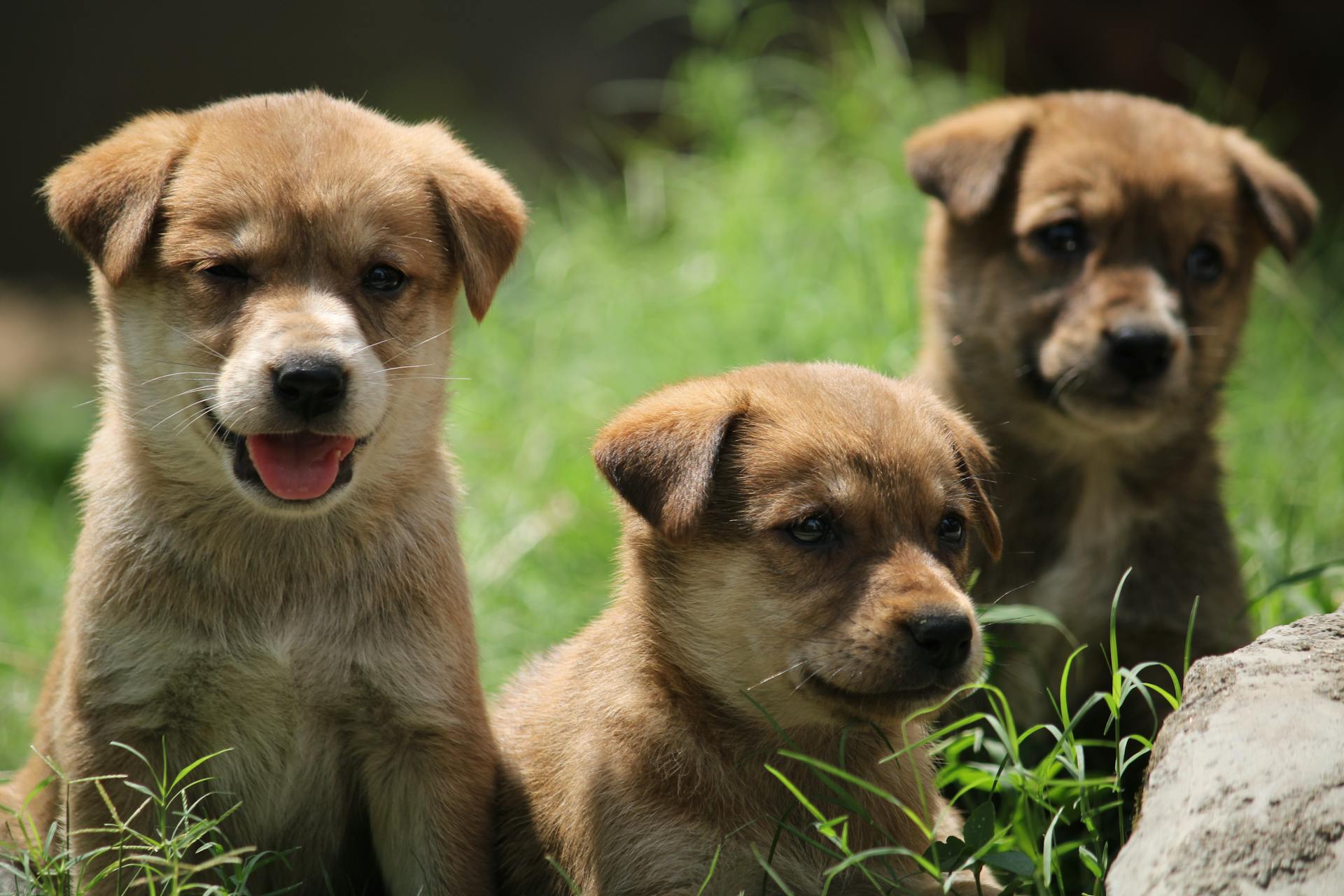
The Origins of Reverse F1b Bernedoodles is a fascinating topic. The Reverse F1b Bernedoodle is a crossbreed of the Bernese Mountain Dog and the Poodle, created over several generations.
These dogs are bred to retain the coat characteristics of the Poodle and first-generation doodles. The Reserve F1b Bernedoodle leans more towards the Bernese Mountain Dog lineage, offering a distinct combination.
Careful breeding has allowed these dogs to embody the best traits of their parents, achieving a perfect balance of size, appearance, and temperament. This is particularly evident in their athletic build, making them excellent running buddies and candidates for dog sports.
The Reserve F1b Bernedoodle became popular as people wanted to emphasize the Bernese traits in their doodle lines while retaining the coat characteristics of the Poodle.
Recommended read: Bernedoodle vs Bernese Mountain Dog
Temperament and Training
F1B Mini Bernedoodles are known for their friendly and affectionate nature, making them sociable dogs that get along well with children, other pets, and strangers.
Their intelligence shines, making them quick learners responsive to training, and they tend to be easy to train due to their eager-to-please disposition.
These dogs thrive on human interaction, relishing the company of their loved ones and forming strong bonds, but they may exhibit a slower maturity rate compared to some other breeds.
Their development and training may require additional patience and understanding, and it's essential to approach their development with patience and consistency.
Additional reading: Bernedoodle Potty Training
Temperament and Personality
Temperament and personality are crucial aspects to consider when bringing a new Mini Bernedoodle into your family. They are known for their friendly and affectionate nature, making them loving and devoted family companions.
Their intelligence shines, making them quick learners responsive to training. This means they'll pick up commands and tricks in no time, and with positive reinforcement, they'll thrive on the attention and praise.
Reverse F1B Bernedoodles, in particular, display a friendly, sociable, and eager-to-please disposition, which makes them a joy to be around. They're natural people-pleasers and will do their best to make you happy.
F1 Mini Bernedoodles are also known for their friendly and affectionate nature, getting along well with children, other pets, and strangers. This makes them a great addition to families with kids or other pets.
F1B Mini Bernedoodles, on the other hand, inherit the intelligence and trainability of their Poodle parent, combined with the gentle disposition of the Bernese Mountain Dog. This results in a playful and outgoing personality that's sure to bring laughter and joy to your life.
Ultimately, understanding the temperament and personality of your Mini Bernedoodle will help you tailor your training and interaction to their unique needs and quirks. By doing so, you'll be able to build a strong bond and create a lifelong friendship.
You might enjoy: Bernedoodles and Goldendoodles
Exercise and Training
Regular exercise is essential for Reverse F1B Bernedoodles, as they need to stay mentally and physically engaged due to their larger size and moderate to high energy levels.
Daily walks, runs, and secure playtime are beneficial for meeting their exercise requirements. Consistent training sessions should also be a part of their routine, as Reverse F1B Bernedoodles possess sharp intellects and respond well to positive reinforcement methods.
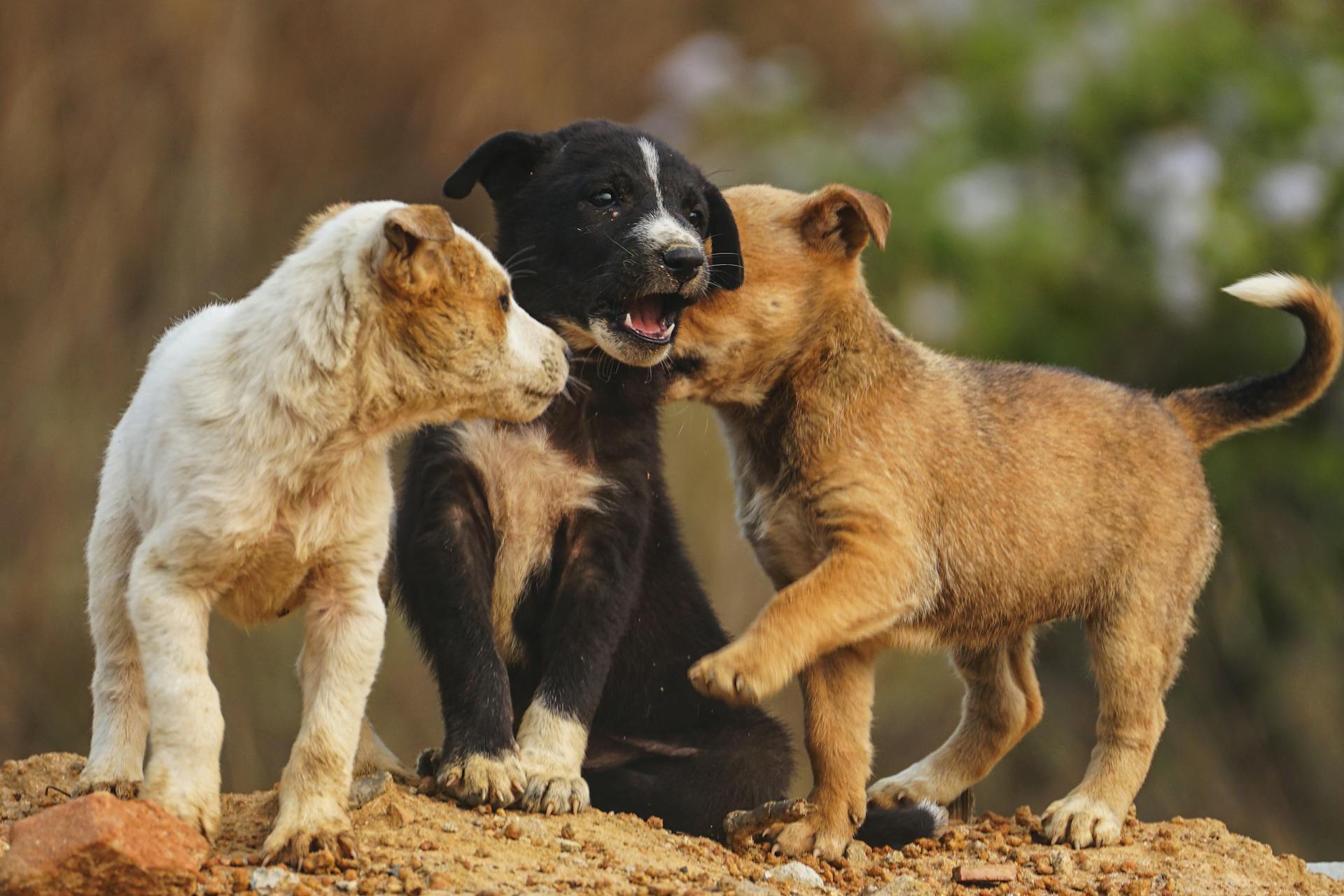
Early socialization and consistent training from an early age contribute to a well-rounded and obedient companion. This is especially important for F1 Mini Bernedoodles, which are known for their friendly and affectionate nature.
F1B Mini Bernedoodles often inherit the intelligence and trainability of their Poodle parent, combined with the gentle disposition of the Bernese Mountain Dog. They are affectionate and loyal companions, known for their playful and outgoing personalities.
Training sessions for Reverse F1B Bernedoodles should be approached with patience and consistency, as they may exhibit a slower maturity rate compared to some other breeds. They tend to take their time in growing both physically and mentally.
To navigate their slower maturity rate, it's advisable to break down training sessions into shorter, more frequent sessions. This approach helps prevent fatigue and keeps the dog engaged and focused.
For another approach, see: Mini Bernedoodle Training
Coat and Grooming
The F1B Mini Bernedoodle's coat is a true marvel, requiring consistent grooming to keep it in top condition. Their dense, wavy, or curly fur should be brushed several times weekly to prevent matting and tangling.
Professional grooming sessions may be necessary to maintain coat health and aesthetics, and occasional trimming or shaving might also be needed depending on the specific coat type. Regular brushing is essential to manage shedding and prevent matting, especially for those with curly coats.
F1B Mini Bernedoodles have hypoallergenic coats that need frequent brushing to prevent tangles and mats, and special attention should be given to their curly coats, with regular grooming sessions to maintain their appearance and health.
Discover more: Mini Bernedoodle Health Issues
Coat Types
Coat types can vary significantly among Mini Bernedoodles, depending on their generation. F1 Mini Bernedoodles can have straight, wavy, or curly coats, with varying textures and densities.
Their coats can resemble those of the Bernese Mountain Dog, with black, white, and brown markings. Some F1 Mini Bernedoodles may have a mix of these coat characteristics.
F1B Mini Bernedoodles, on the other hand, tend to have curlier coats due to the increased percentage of Poodle genetics. This makes them a popular choice for individuals with allergies or sensitivities to pet dander.
You might like: F1 vs F1b Bernedoodle
Their coats are often hypoallergenic and non-shedding, which is a significant advantage for many dog owners. F1B Mini Bernedoodles come in a diverse array of colors, including black, white, cream, and various shades of brown.
F2 Mini Bernedoodles may exhibit a wider range of coat types and characteristics, similar to their F1 counterparts, or inherit a more consistent curl from their Poodle ancestry.
Size Variations
Size Variations play a significant role in determining the overall appearance of a Mini Bernedoodle. F1 Mini Bernedoodles can range in size from small to medium, weighing between 25 to 50 pounds.
Their height at the shoulder typically ranges from 18 to 22 inches, and this can vary depending on the size of the parent breeds. If the Bernese Mountain Dog parent is larger, the offspring may also be larger.
F1B Mini Bernedoodles tend to lean toward the smaller end of the spectrum, weighing between 20 to 40 pounds. They may also stand around 12 to 18 inches tall at the shoulder.
The size of F2 Mini Bernedoodles can vary widely, as they inherit genes from two F1 Mini Bernedoodle parents. This means that some may be similar in size to their F1 counterparts, while others may exhibit a broader size range.
Coat Care
The coat of a Reverse F1B Bernedoodle requires consistent grooming to keep it in top condition, with dense, wavy, or curly fur that should be brushed several times weekly to prevent matting and tangling.
F1B Mini Bernedoodles have hypoallergenic coats that need frequent brushing to prevent tangles and mats, especially for those with curly coats.
Regular grooming sessions should include ear cleaning, nail trimming, and occasional baths for F1 Mini Bernedoodles, with professional grooming recommended for complex coat maintenance.
To manage shedding and prevent matting, regular brushing is essential for F2 Mini Bernedoodles, especially for those with curly coats.
F1B Mini Bernedoodles have a curlier, denser coat that is more resistant to shedding due to their higher percentage of Poodle genetics, making them an excellent choice for individuals with allergies or sensitivities to pet dander.
Professional grooming sessions may be necessary to maintain coat health and aesthetics for Reverse F1B Bernedoodles, depending on their specific coat type.
The coat type of F2 Mini Bernedoodles varies, but regular brushing is essential to manage shedding and prevent matting, especially for those with curly coats.
Expand your knowledge: Bernedoodle Do They Shed
Health Considerations
F1B Mini Bernedoodles may be prone to inherited health issues common to Bernese Mountain Dogs and Miniature Poodles, such as hip dysplasia, elbow dysplasia, and certain eye conditions.
Responsible breeding practices, including testing and screenings, can help reduce the risk of inherited health issues from generation to generation.
Our breeding program prioritizes the health and well-being of our puppies, and we conduct thorough health screenings on our parents to minimize the risk of inherited health issues.
F1B Mini Bernedoodles may have a reduced risk of certain genetic health issues due to the increased percentage of Poodle genetics, but it's essential for breeders to continue conducting health screenings and genetic testing.
Health testing and verified pedigrees are crucial in ensuring that our puppies receive the healthiest possible start in life.
See what others are reading: Bernedoodle Health Issues
Frequently Asked Questions
Should I get an F1 or F1B Bernedoodle?
If you're looking for a lower-shedding Bernedoodle, consider an F1B, which has a higher success rate for non-shedding and is ideal for families with allergies. F1 Bernedoodles, on the other hand, may shed more, but still make wonderful pets.
How big do F1 mini Bernedoodles get?
F1 mini Bernedoodles typically weigh between 18-45 pounds and stand 18-22 inches tall at the shoulder. If you're looking for a smaller dog, consider a tiny or small mini Bernedoodle.
How much does a F1B Bernedoodle cost?
The cost of a F1B Bernedoodle can range from $1,000 to $3,000, depending on factors such as breeder reputation and bloodline. Adoption fees are often lower, around $500-$1,000.
Sources
- https://www.bernerbabies.com/bernerdoodleinfo
- https://www.cherryblossombernedoodles.com/doodle-info
- https://www.wisconsindesignerdoodles.com/what-is-a-reverse-f1b-bernedoodle
- https://www.jennaleedoodles.com/post/mini-bernedoodle-generation-differences-f1-f1b-f2
- https://premierpups.com/blogs/mini-bernedoodle-generations-explained
Featured Images: pexels.com
